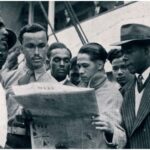Mary Annette Anderson’s name holds a special place in American education history. She not only led her graduating class as valedictorian at Middlebury College in 1899 but also earned the distinction of being the first African American woman admitted to the prestigious Phi Beta Kappa Society.
Her achievements spoke volumes at a time when opportunities for Black women in higher education were rare. Though her accomplishments were celebrated, her identity as a Black woman was often overlooked by mainstream press in New England.
Rising to the Top at Middlebury College
Anderson graduated from Middlebury College in Vermont with a degree in English. She was chosen valedictorian, the top student of her class, and delivered a speech titled “The Crown of Culture.”
She also wrote and recited a poem in honor of her class, leaving a lasting impression on those who attended. Furthermore, Anderson composed the class song, “Tenting on the Old Camp Ground,” which was sung during the 1899 Class Day exercises.
Her academic performance earned her a spot in Phi Beta Kappa, America’s oldest honor society. This made her the first African American woman to receive this honor from Middlebury College.
Early Life in Vermont and Academic Excellence
Born on July 27, 1874, in Shoreham, Vermont, Anderson came from a family rich in resilience. Her father, William John Anderson, was a formerly enslaved person from Virginia. Her mother, Philomine Langlois Anderson, was of French Canadian and American Indian heritage.
Mary attended Northfield Seminary in Massachusetts, where she excelled both academically and socially. She was class president and graduated in 1895. Her achievements there paved the way for her entry into Middlebury College.
Anderson’s educational success reflected her family’s strength and her personal commitment to learning. Despite the barriers of her time, she stood out in both academic circles and campus life.
Teaching Career at Historically Black Colleges
After college, Anderson moved to New Orleans to teach at Straight University, now known as Dillard University. She taught there from 1899 to 1900, helping to uplift African American students in the South.
Later, she moved to Washington, DC, and joined Howard University’s faculty. There, she taught English grammar and history from 1900 until 1907. Her work at these institutions played a key role in advancing education for Black students in post-Reconstruction America.
Her career made her a well-respected figure among Black educators, though job opportunities in predominantly white New England were limited for someone of her background.
Personal Life and Lasting Legacy
On August 7, 1907, Anderson married Walter Lucius Smith, a fellow educator and leader. Smith worked at the M Street Academy for African American students, which later became Paul Laurence Dunbar High School. After marriage, Anderson left her professional career but continued to live between Washington, DC, and her hometown in Vermont.
Anderson passed away on May 2, 1922, at the age of 47 in Shoreham. Though she died young, her impact lasted well beyond her lifetime.
In 2015, Middlebury College honored her legacy by opening the Anderson Freeman Resource Center. Named after Anderson and Martin Henry Freeman, the center serves as a support space for students of color and underrepresented groups on campus.
Remembering an Education Trailblazer
Mary Annette Anderson’s story is one of determination, brilliance, and quiet leadership. Her success as the first African American woman valedictorian at Middlebury College paved the way for future generations.
Though she faced racism and employment discrimination, her influence in the classroom and community endured. Today, her life reminds us of the power of education and the importance of recognizing pioneers whose contributions were long overlooked.





